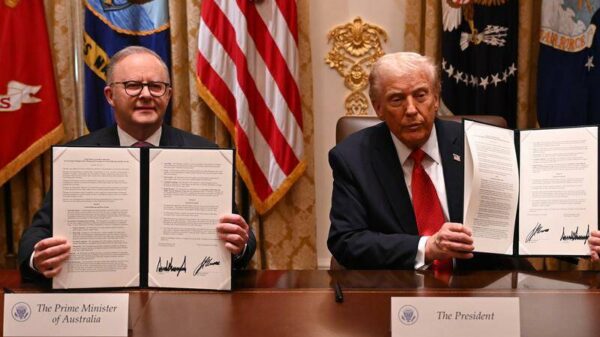The Home Affairs (2025 Measures No. 1) Bill 2025 was passed today by the Australian Parliament, with support from both the Liberal and Labor parties. This legislation, which has raised significant concerns, is linked to a controversial agreement with Nauru that will cost taxpayers approximately $2.5 billion. The bill is expected to have severe implications for tens of thousands of individuals, including potential violations of their rights to natural justice.
In a hastily arranged hearing last night, lawmakers discussed the ramifications of the bill and the recently signed memorandum of understanding with Nauru. Critics of the legislation have highlighted the possibility that the Department of Home Affairs could not confirm whether the Nauru agreement aligns with the Refugee Convention. Nauru’s President, David Adeang, has indicated that the island nation’s long-term objective is to return asylum seekers to their countries of origin, a stance that raises legal and ethical questions regarding international obligations.
Under the new law, the Minister for Home Affairs is granted the authority to compel individuals, including women fleeing domestic violence, to obtain passports. This requirement poses a serious risk, as it could force individuals to confront their abusers. Critics argue that the law leaves vulnerable individuals with no option but to comply or face incarceration for attempting to protect themselves.
The legislation also permits the Australian Government to forcibly relocate individuals to Nauru or any other designated third country without considering their rights to natural justice. Public submissions regarding the bill were not accepted during the parliamentary hearing, a move that has drawn criticism from various quarters. Nonetheless, the Greens party managed to submit several public comments for the record.
Senator David Shoebridge, the Greens’ spokesperson for immigration, condemned the law, stating, “The cornerstone of our entire legal system, natural justice, has just been smashed by the Albanese Government.” He emphasized that the law undermines the principles of fairness and multiculturalism in Australia.
Shoebridge further remarked that such legislative measures contribute to the rise of far-right extremism in the country. He argued that Australia’s approach to immigration should reflect respect for neighboring nations rather than resorting to financial incentives that could turn them into a “21st-century penal colony.”
The concerns raised about the implications of the Home Affairs (2025 Measures No. 1) Bill 2025 signal a critical moment in Australian politics, as the nation grapples with its responsibilities toward asylum seekers and its relations with Pacific neighbors. The fallout from this bill may have long-lasting effects on Australia’s political and moral standing in the region, as well as on the individuals affected by these policies.






























































